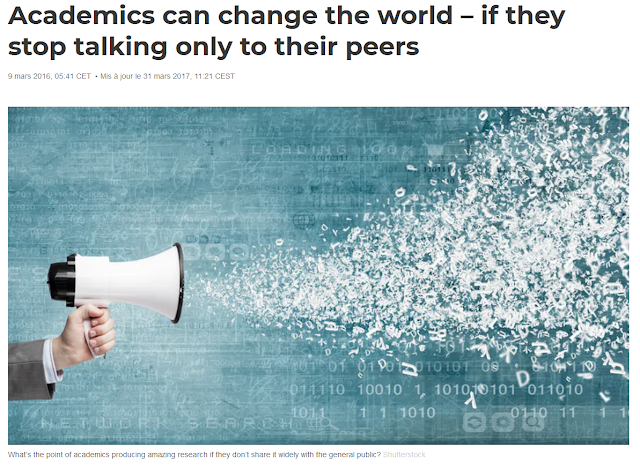Via The Conversation:
Research and creative thinking can change the world. This means that academics have enormous power. But, as academics Asit Biswas and Julian Kirchherr have warned, the overwhelming majority are not shaping today’s public debates.
Instead, their work is largely sitting in academic journals that are read almost exclusively by their peers. Biswas and Kirchherr estimate that an average journal article is “read completely by no more than ten people”. They write:
Up to 1.5 million peer-reviewed articles are published annually. However, many are ignored even within scientific communities – 82% of articles published in humanities [journals] are not even cited once.This suggests that a lot of great thinking and many potentially world altering ideas are not getting into the public domain. Why, then, are academics not doing more to share their work with the broader public?
The answer appears to be threefold: a narrow idea of what academics should or shouldn’t do; a lack of incentives from universities or governments; and a lack of training in the art of explaining complex concepts to a lay audience.
Are anthropologists more prone at failing to reach outside academia than experts in other disciplines? What can we do better?
I've worked on projects within anthropology that were born of grand popularizing intentions. More often than not, they still ended up mostly catering to academics talking to other academics, via formats that maintained the most traditional academic structure and which still act as academic currency. Since then, I've experimented with (my own) writing in ways to better engage public audiences and make some of the theoretical concepts and ethnographic data less impenetrable without watering down the anthropological quality. It's a skill you have to practice to refine. It most certainly isn't taught in any systematic way in academia, and even if it were, I'm not certain everyone who is good at one can compete in the other. I'd love to be proven wrong. Thoughts?
The second part of this proposition suggests that anthropologists talk to/at their peers too much and at the expense of the wider public. I'd say that as a discipline, we talk within too small a circle of peers interested only in our tiny niche of interests. Both of these things do a disservice to popular(izing) anthropology. Certainly anthropologists can present the big picture concepts to the outside world better if we open up to each other first.
Comment below to share your favorite public-facing or popular anthropology resources.










